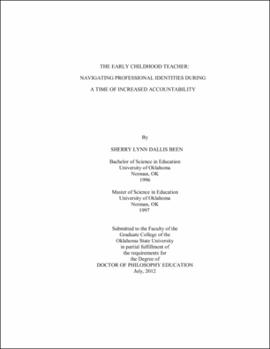| dc.contributor.advisor | Castle, Kathryn | |
| dc.contributor.author | Been, Sherry Lynn Dallis | |
| dc.date.accessioned | 2013-11-26T08:33:19Z | |
| dc.date.available | 2013-11-26T08:33:19Z | |
| dc.date.issued | 2012-07 | |
| dc.identifier.uri | https://hdl.handle.net/11244/7203 | |
| dc.description.abstract | Scope and Method of Study: | |
| dc.description.abstract | The focus of this qualitative hermeneutic phenomenological study was to examine early childhood teacher professional identity and answer the main question, what does it mean to be an early childhood teacher in today's educational climate. The six research participants, early childhood teachers with five or more years teaching experience, worked within Midwest urban or surrounding suburban settings and were all prekindergarten or kindergarten teachers. Data collected through two semi-structured interviews, protocol writing, a focus group, and autobiographical writing were used to identify themes through selective highlighting (van Manen, 1990). This study focused on a complex understanding of professional identity formation, keeping in mind that identities are "multi-faceted" (Alsup, 2006), and are "socially and culturally" (Swennen, Volman, & van Essen, 2008) constructed by lived experiences (van Manen, 1990) throughout teachers' lives. | |
| dc.description.abstract | Findings and Conclusions: | |
| dc.description.abstract | The themes that emerged included the theme of teachable moments: "when that bird flies in," advocacy: "bucking the system," relationships: "every walk of life is at our school," and stress and struggles: "wreaking havoc on the structure of the classroom." These themes add to the complicated conversation of the early childhood teacher. Diving into the themes exposed the underlying voice of children, oppression of the early childhood teacher, the risk of losing the art of teaching, and red flags for the future of the early childhood teacher and young children. | |
| dc.description.abstract | Early childhood teachers are being negatively affected by the deskilling and undervaluing of the profession as a whole. A direct line of influence is the early childhood teachers' impact on the lives of young children. The current state of early childhood education illuminates reasons to pause and reflectively engage in the complicated conversation concerning the early childhood teacher, for the future of young children. | |
| dc.format | application/pdf | |
| dc.language | en_US | |
| dc.rights | Copyright is held by the author who has granted the Oklahoma State University Library the non-exclusive right to share this material in its institutional repository. Contact Digital Library Services at lib-dls@okstate.edu or 405-744-9161 for the permission policy on the use, reproduction or distribution of this material. | |
| dc.title | Early childhood teacher: Navigating professional identities during times of increased accountability | |
| dc.contributor.committeeMember | Brown, Pamela U. | |
| dc.contributor.committeeMember | Wang, Hongyu | |
| dc.contributor.committeeMember | Lane, Mona | |
| osu.filename | Been_okstate_0664D_12033.pdf | |
| osu.accesstype | Open Access | |
| dc.type.genre | Dissertation | |
| dc.type.material | Text | |
| dc.subject.keywords | accountability | |
| dc.subject.keywords | early childhood teacher | |
| dc.subject.keywords | hermeneutic phenomenology | |
| dc.subject.keywords | increased mandates | |
| dc.subject.keywords | life stories | |
| dc.subject.keywords | professional | |
| thesis.degree.discipline | Education | |
| thesis.degree.grantor | Oklahoma State University | |
